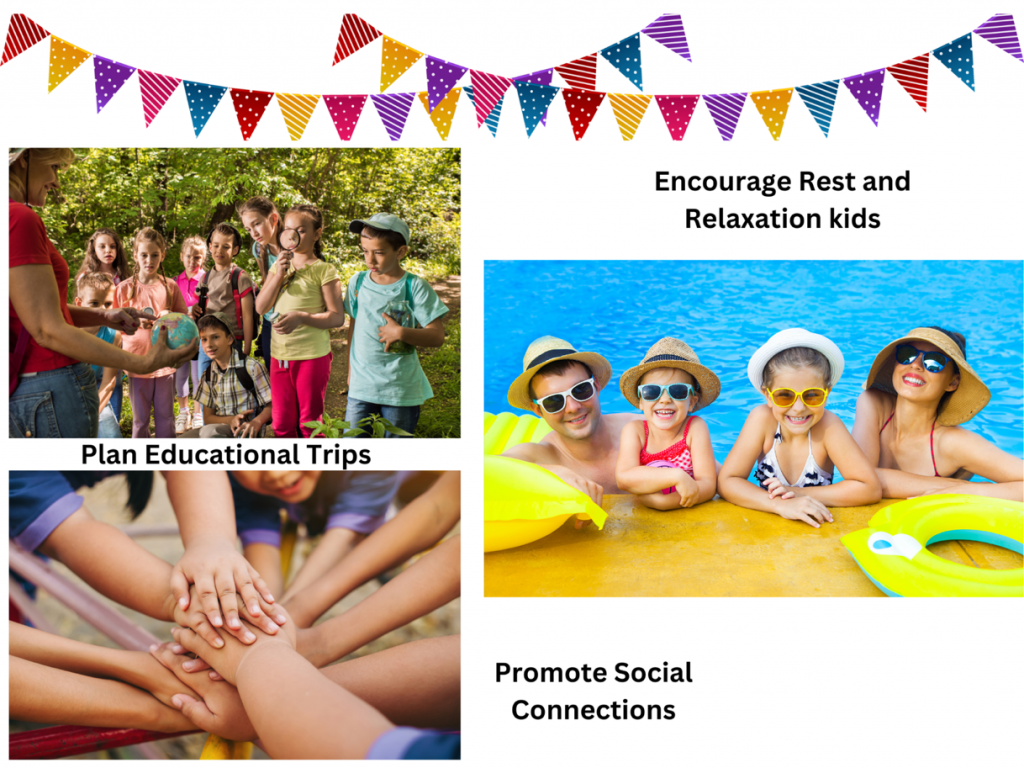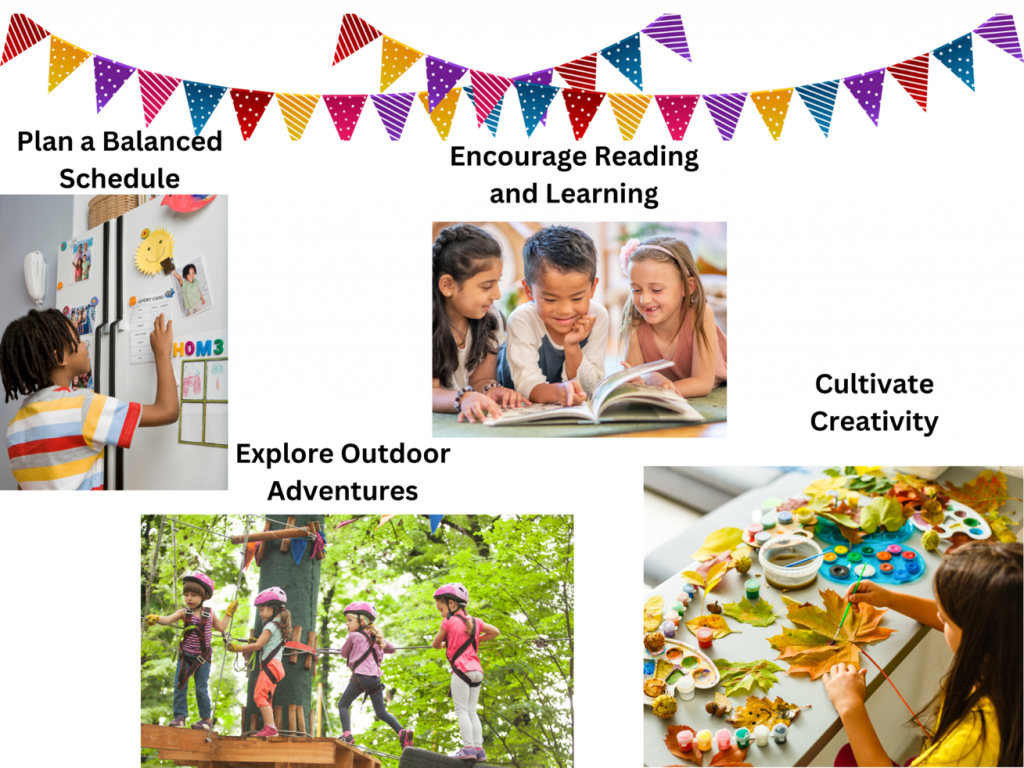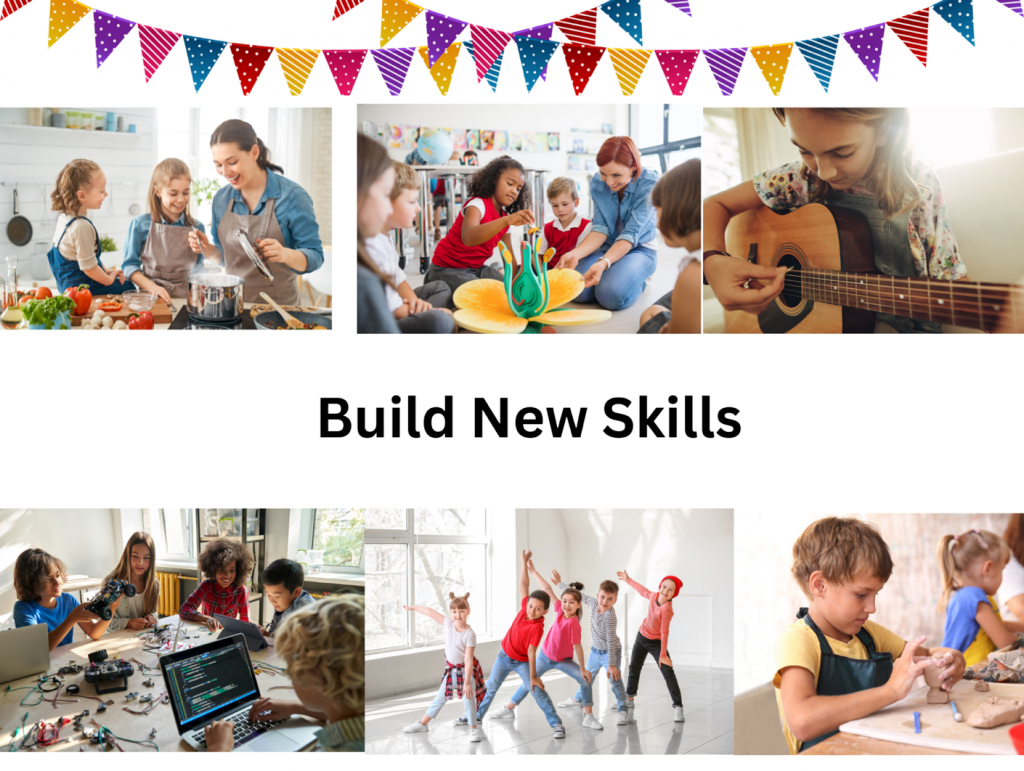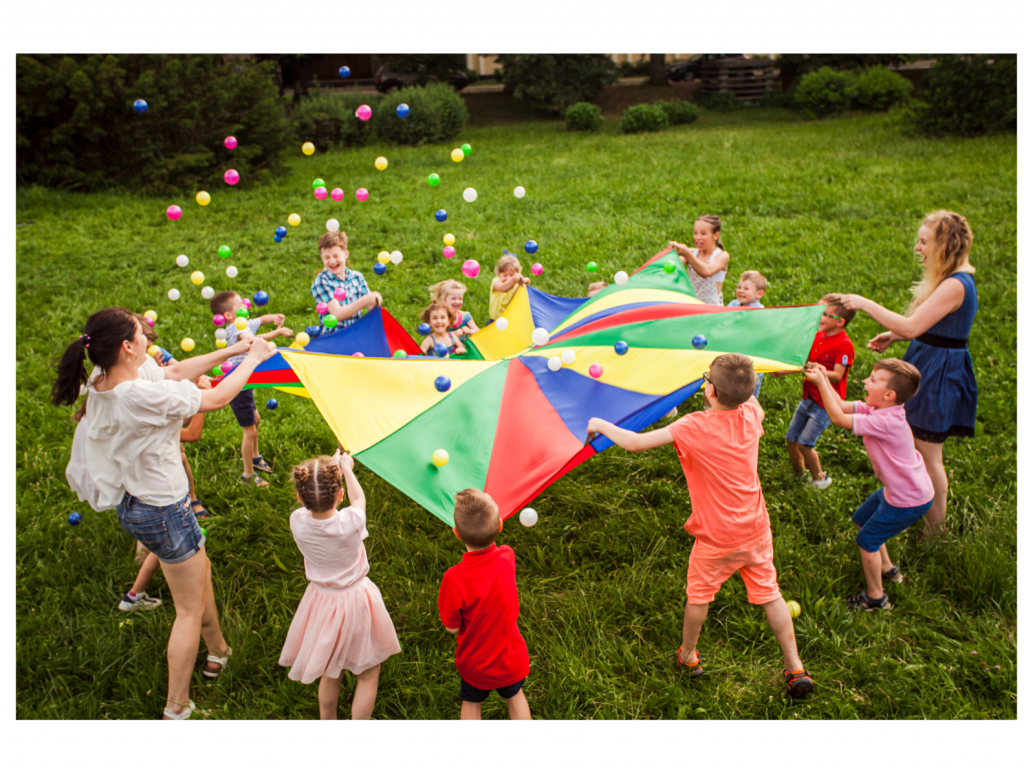Summer breaks are a time of joy and excitement for children, but for parents, they can also bring a unique set of challenges. The long, unstructured days can leave kids restless and parents overwhelmed. However, with a bit of planning and creativity, summer breaks can become a golden opportunity for family bonding, learning, and fun. In this guide, we’ll explore practical tips and ideas to help parents make the most of these precious months, ensuring a summer that’s memorable for all the right reasons. From educational activities to outdoor adventures, we’ll cover everything you need to create a balanced and fulfilling summer break for your family.
How to Make the Best of Summer Breaks for Your Children
- Plan a Balanced Schedule
A balanced schedule ensures that your child has time for relaxation, learning, and play. Start by creating a weekly calendar that includes various activities, balancing screen time with outdoor play, creative projects, and educational pursuits.
- Morning:Academic activities or skill-building exercises.
- Afternoon:Outdoor activities, sports, or physical exercises.
- Evening:Family time, reading, or hobbies.
Personal Anecdote: “Last summer, we created a colorful calendar together, which made my child excited about each day’s activities and gave us a clear structure to follow.”
- Encourage Reading and Learning
Summer is an ideal time to cultivate a love for reading and learning. Visit your local library or bookstore and let your child pick out books they’re interested in. Consider setting up a reading challenge or a book club with their friends.
- Reading:Create a cozy reading nook and set daily reading goals.
- Learning Kits:Invest in educational kits that make learning fun, such as science experiments or art projects.
- Visual Aid:Use our reading tracker chart to help children log the books they’ve read and earn rewards for milestones.

- Explore Outdoor Adventures
Outdoor activities are not only fun but also crucial for physical health and development. Plan regular outdoor adventures that can range from simple backyard play to more structured activities.
- Nature Walks: Explore local parks, hiking trails, or botanical gardens.
- Sports: Encourage participation in sports like soccer, swimming, or cycling.
- Gardening: Start a small garden project to teach responsibility and the basics of plant biology.
- Community Engagement: Look for local community events or nature workshops that you can attend together to foster a sense of community and belonging.
- Cultivate Creativity
Encouraging creativity is essential for a child’s development. Summer break provides the perfect opportunity to explore various forms of creative expression.
- Arts and Crafts: Set up a craft station with supplies for painting, drawing, and building.
- Music and Dance: Encourage musical exploration with instruments or dance sessions.
- Writing: Motivate your child to write stories, poems, or keep a summer journal.
- Parental Involvement: Join in on arts and crafts sessions or collaborate on a family art project to make it a shared experience.
Personal Anecdote: “Creating a family mural one summer brought out our collective creativity and became a cherished memory.”

- Plan Educational Trips
Turn summer trips into educational experiences. Visit museums, science centers, historical sites, and cultural festivals to make learning interactive and fun.
- Museums and Exhibits: Explore various museums related to science, history, art, or natural history.
- Zoos and Aquariums: Learn about wildlife and marine life conservation.
- Cultural Festivals: Experience different cultures through food, music, and activities.
Personal Anecdote: “Our trip to the science museum sparked my child’s interest in astronomy, leading to many evenings spent stargazing.”
- Promote Social Connections
Summer is also a time for strengthening social bonds. Encourage your child to spend time with friends and family.
- Playdates: Organize playdates with friends for social interaction.
- Family Activities: Plan family game nights, movie marathons, or camping trips.
- Community Involvement: Participate in community events, volunteer work, or local clubs.
- Parental Involvement: Be proactive in setting up and participating in these activities to model social engagement.
- Encourage Rest and Relaxation
While keeping your child engaged is important, remember that rest is equally crucial. Ensure there’s plenty of time for relaxation and downtime.
- Quiet Time: Encourage activities like reading, puzzles, or meditation.
- Healthy Sleep: Maintain a consistent sleep schedule for overall well-being.
- Specific Suggestions: Create a quiet, comfortable space for relaxation activities, and incorporate a nightly routine to help your child wind down.

9.Build New Skills
Learning new skills can be both fun and rewarding. Identify your child’s interests and find activities that align with them.
- Cooking: Teach basic cooking skills by involving your child in meal preparation.
- Coding: Enrol in online coding classes or use apps designed for kids to learn programming. Coding is not just about writing code; it’s about problem-solving, logical thinking, and creativity.
- Languages: Introduce a new language through apps, books, or language classes.
Highlight: The Importance of Learning Coding
Learning to code is far more than just writing lines of instructions for a computer; it’s an essential skill that cultivates problem-solving, logical thinking, and creativity. Through coding, children develop critical thinking skills that are valuable across various areas of their lives. They learn to approach problems methodically, break them down into manageable components, and devise effective solutions. Additionally, coding encourages creativity, allowing kids to build their own projects—from simple games to complex applications—thereby nurturing their ability to think outside the box. These skills not only build technical proficiency but also significantly aid in your child’s overall development, preparing them for a future where technology plays a pivotal role.
SkoolOfCode’s Summer Coding Camp

SkoolOfCode’s Summer Coding Camp:
- Tailored Curriculum: Each camp is tailored to the specific age group it serves, ensuring the learning experience is appropriate and engaging for every age group.
- Experienced Instructors: SkoolOfCode employs instructors who are not only proficient in coding but also skilled in teaching children.
- Hands-On Learning: These camps focus on hands-on learning, where kids get to practice coding in real-time.
- Collaborative Environment: Summer camps provide a collaborative environment where kids can work together on projects.
- Encouragement of Creativity: At SkoolOfCode, children are encouraged to use their imagination to create their own projects.
Age-Specific Programs:
- Ages 6-8: Introduction to Coding
- Block-Based Coding with Scratch and Edublock: Young learners start their coding journey with intuitive, block-based programming.
- Fundamentals of Robotics: Using age-appropriate robotics kits, children are introduced to basic engineering concepts and simple programming to bring their creations to life.
- Ages 9-12: Intermediate Coding and Exploration
- Advanced Scratch Programming: Students delve deeper into Scratch, learning to create more complex animations, games, and stories.
- Python Basics: Students start with simple scripts and progress to creating basic applications.
- Roblox Game Development: This module allows kids to explore 3D game design and development using Roblox.
- Ages 13-16: Advanced Programming and Specialization
- Advanced Python and App Development: Teens move on to develop apps that solve real-world problems.
- 3D Game Design: Students learn about game mechanics, storytelling, and user experience, creating immersive gaming environments.
- Robotics and Automation: Advanced robotics sessions cover the integration of sensors and actuators, giving students the tools to design and program more sophisticated robotic systems.
Enrol Today: Give your child the gift of coding this summer. Enrol in SkoolOfCode’s summer camps to develop valuable skills, meet like-minded peers, and have fun creating their own digital projects.
Refresh and Recharge: Why Parents Need Breaks During Summer Vacation
Taking a break for parents during their children’s summer break is essential for several reasons:

Mental Health
- Stress Relief: Parenting can be highly stressful, especially during summer when children are home all day. Taking a break helps parents alleviate stress and recharge their mental batteries.
- Preventing Burnout: Continuous caregiving without breaks can lead to burnout.
Physical Health
- Rest and Recovery: Regular breaks allow parents to rest and recover physically.
- Healthier Lifestyle Choices: Breaks can give parents time to exercise, eat healthily, and sleep better.
Quality of Parenting
- Improved Patience: Well-rested parents are generally more patient and less irritable.
- Enhanced Creativity and Problem-Solving: Taking a step back allows parents to approach problems with a fresh perspective.

Relationship Maintenance
- Strengthening Marital/Partner Relationships: Time away from children can give couples the opportunity to reconnect.
- Social Connections: Breaks provide parents with the chance to spend time with friends and family.
Role Modelling
- Demonstrating Self-Care: When parents take breaks, they model the importance of self-care for their children.
- Promoting Independence: Allowing children to spend time with other caregivers helps them develop independence.
Personal Growth and Fulfilment
- Pursuing Interests: Time away from parenting duties enables parents to pursue personal interests or professional development.
- Achieving Balance: Finding a balance between parenting responsibilities and personal time is crucial for long-term happiness.
Strategies for Taking Breaks:

- Planning Ahead: Scheduling regular breaks, even if they are short, can make a significant difference. Plan ahead by setting specific times for breaks throughout the day. This helps create a predictable rhythm and ensures everyone gets the rest they need.
- Utilizing Support Systems: Don’t hesitate to rely on partners, family members, or babysitters. Sharing responsibilities can lighten the load and provide you with much-needed time to recharge. It also allows children to spend quality time with other trusted adults.
- Creating a Routine: Establish a summer routine that includes designated downtime. A consistent routine helps children feel secure and understand when to expect breaks. Incorporate activities such as quiet reading time, napping, or simply relaxing to ensure everyone gets a chance to unwind.
- Engaging in Family Activities: Plan activities that everyone enjoys. Engaging in family activities like board games, outdoor adventures, or cooking together can be a fun way to take a break while spending quality time together. These activities provide a change of pace and help strengthen family bonds.
- Seeking Professional Help: If stress or burnout becomes unmanageable, consider seeking help from a therapist or counsellor. Professional support can provide strategies to cope with stress, improve mental health, and ensure that both parents and children can enjoy the summer break to the fullest.
Conclusion
Making the best of summer breaks requires a blend of planning, creativity, and flexibility. By incorporating a balanced schedule, encouraging reading and learning, exploring outdoor adventures, cultivating creativity, planning educational trips, promoting social connections, and ensuring rest and relaxation, you can create a memorable and enriching summer for your family. Additionally, introducing your child to new skills, such as coding through SkoolOfCode’s summer camps, can provide them with valuable tools for their future.
Key Suggestions for Implementation:
- Create a Visual Schedule: Use a colourful calendar to plan out daily and weekly activities. This helps children anticipate and get excited about upcoming events, providing structure and variety.
- Set Up a Reading Nook: Designate a cozy area in your home for reading. Stock it with books of various genres and consider incorporating a reading tracker chart to log books read and celebrate milestones.
- Plan Regular Outdoor Adventures: Schedule weekly nature walks, sports activities, or gardening projects. Involve your children in the planning process to foster a sense of ownership and excitement.
- Encourage Creativity Daily: Establish a craft station with supplies for various arts and crafts activities. Engage in joint creative projects, such as family murals or music sessions, to make creativity a shared experience.
- Incorporate Educational Trips: Plan visits to local museums, science centres, or cultural festivals. Make these trips interactive by encouraging your children to ask questions and explore exhibits.
- Promote Social Engagement: Organize regular playdates, family game nights, or community involvement activities. Encourage your child to participate in local clubs or volunteer work to build social connections.
- Ensure Downtime: Balance active and learning activities with periods of rest and relaxation. Create a quiet space for activities like puzzles, meditation, or simply unwinding, and maintain a consistent sleep schedule.
- Introduce Skill-Building Activities: Identify your child’s interests and find related activities. Enrol them in summer camps like SkoolOfCode to learn coding, robotics, or game development, ensuring they develop valuable skills in a fun, engaging way.
Remember, the goal is to create a enjoyable and beneficial summer for your child’s growth. Stay flexible and attentive to your child’s interests and needs, and be open to adjusting plans as necessary. Embrace this summer as an opportunity to bond with your child, explore new activities, and create lasting memories. Enjoy the journey together.
By following these suggestions and keeping a balanced approach, you can ensure a summer break that is fulfilling, educational, and fun for the entire family.
Ms.Manpreet Virk, an educator at SkoolOfCode with a degree in M.Phil and Master in Computer Science. She is passionate about learning and teaching young minds.
